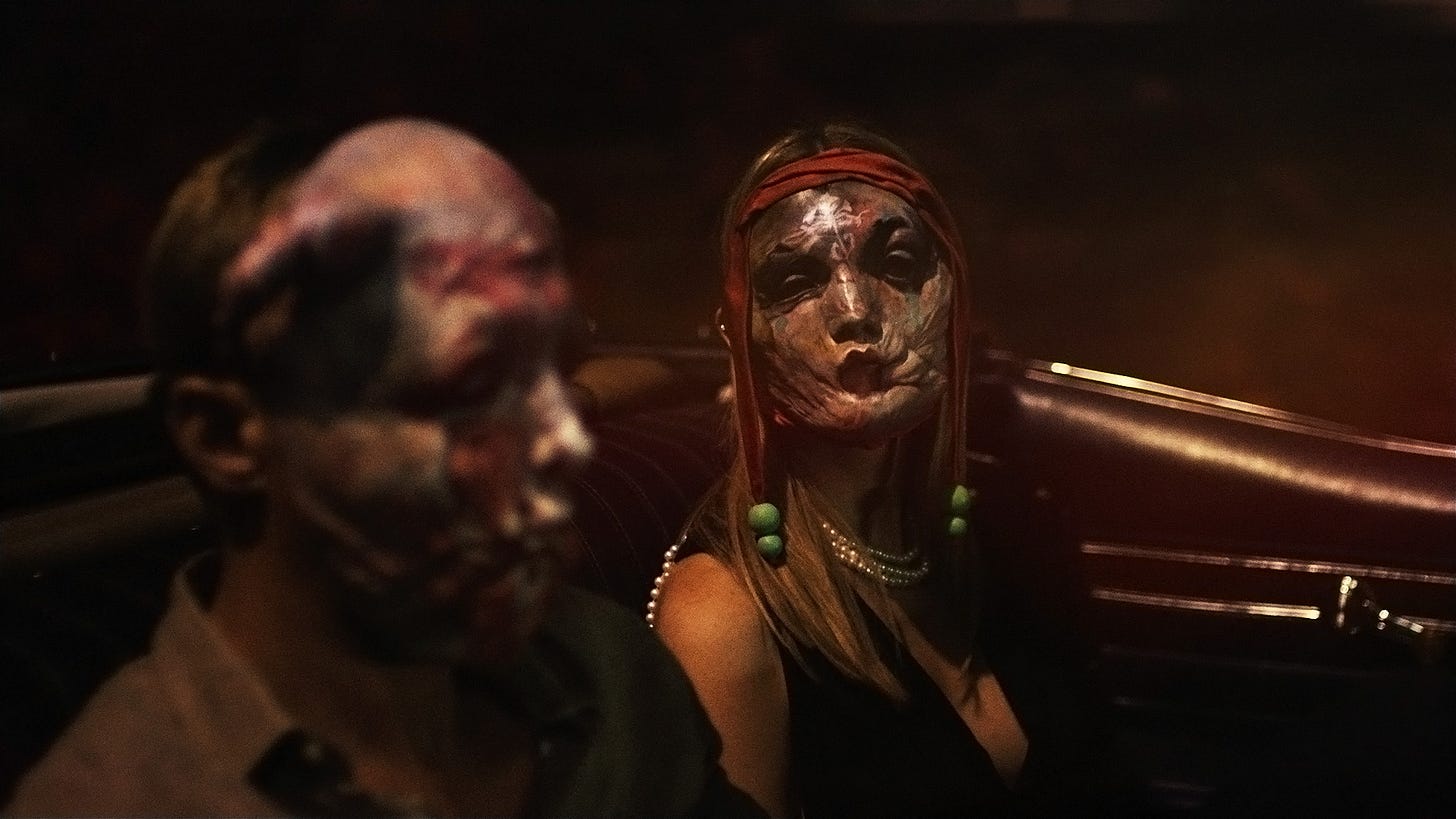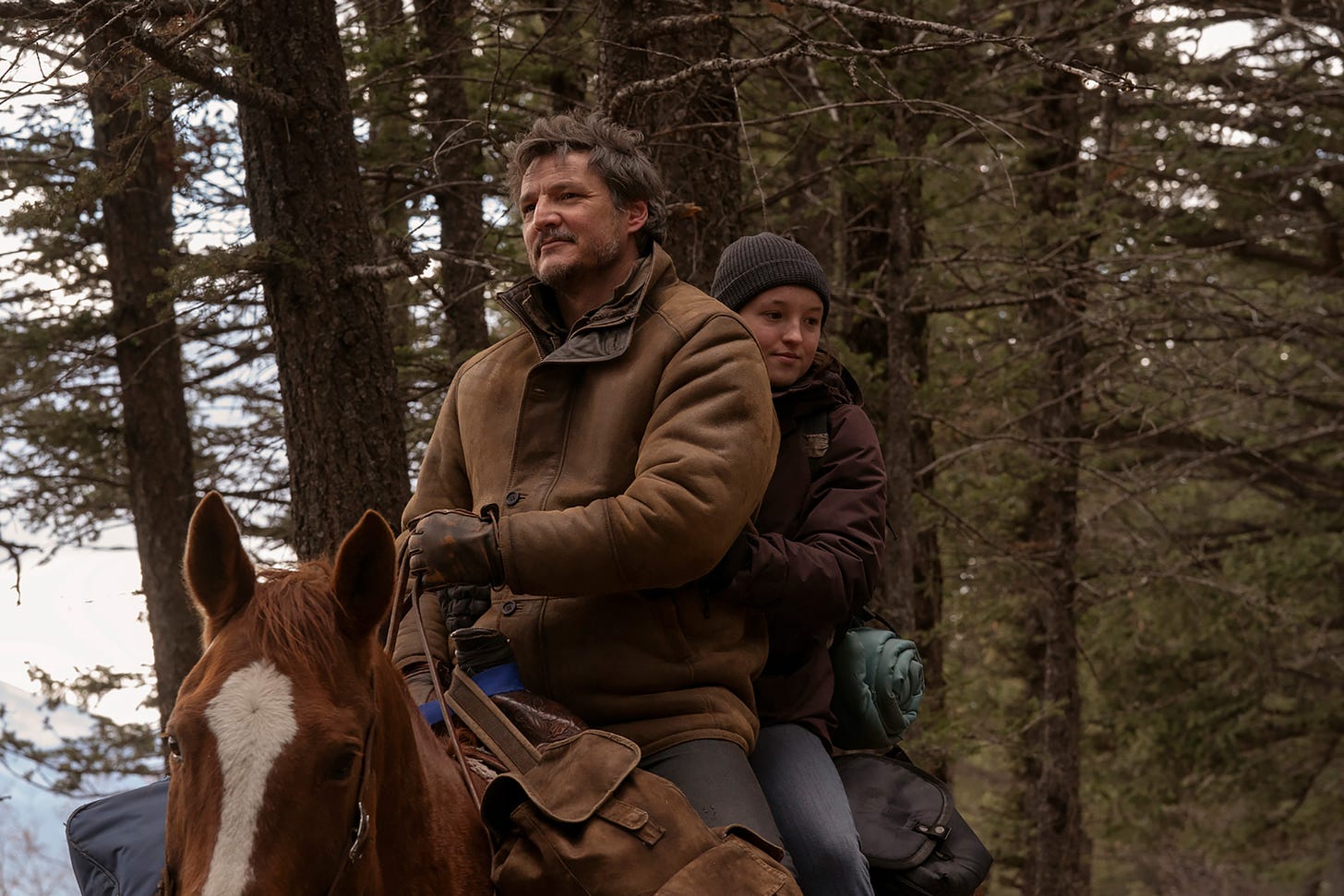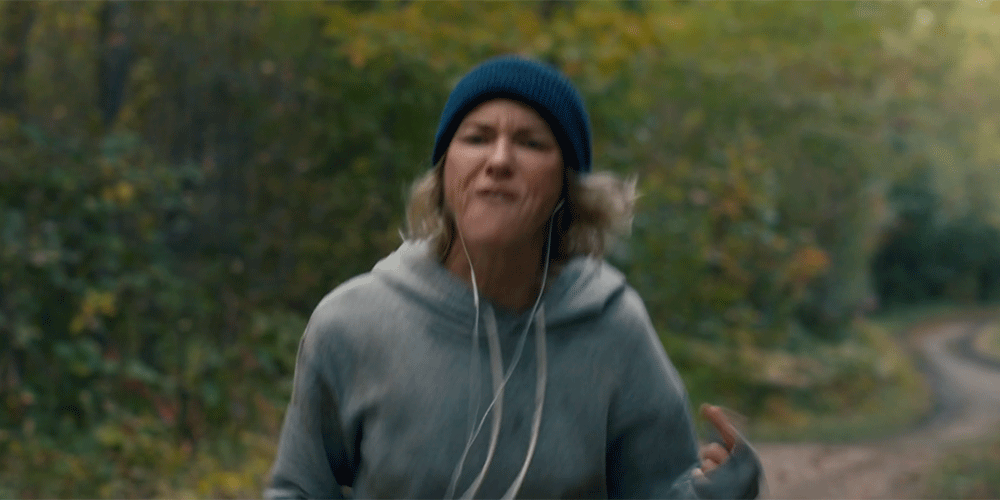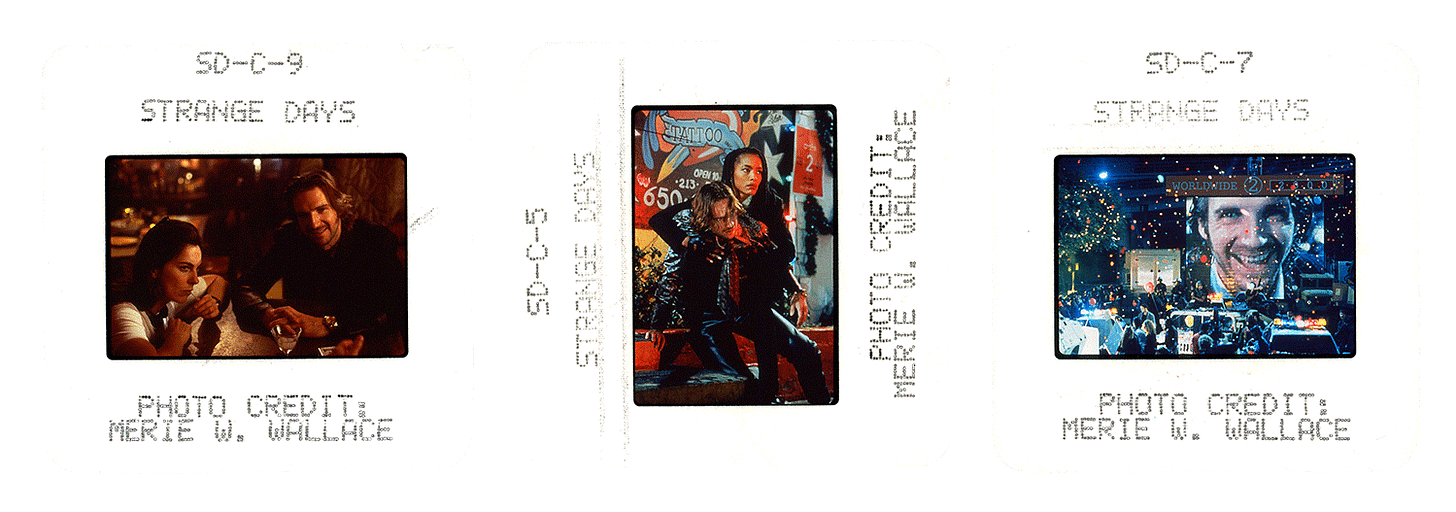The sheer willful and malicious contempt of studio executives making hundred times more money than the creators whose work they sell is finally approaching the “find out” stage of their unchecked greed. Will the system actually change as a result? Maybe. The chance is greater now than before since the WGA just wanted less than 2% of the billions in profits studios make. Now, with the backing of SAG/AFTRA, everyone striking would be shortsighted to not ask for everything. Here’s hoping the union coffers have enough money in them to support everyone who’s out of work so the studios can really feel the heat come fall.
Because that’s when things will get interesting. Both for them and the many festivals hoping to roll out awards contenders. Because if attending Venice, TIFF, and Telluride to promote your films is considered crossing the picket line, the environment will be very different than usual. No interviews. No press conferences. No photo calls. Will studios pull titles as a result? Saving their debuts for a more robust moment of marketing power? What will award season look like if this continues? Might as well just have press releases for the winners since the auditoriums will be empty. It will be interesting to watch and see.
What I Watched:
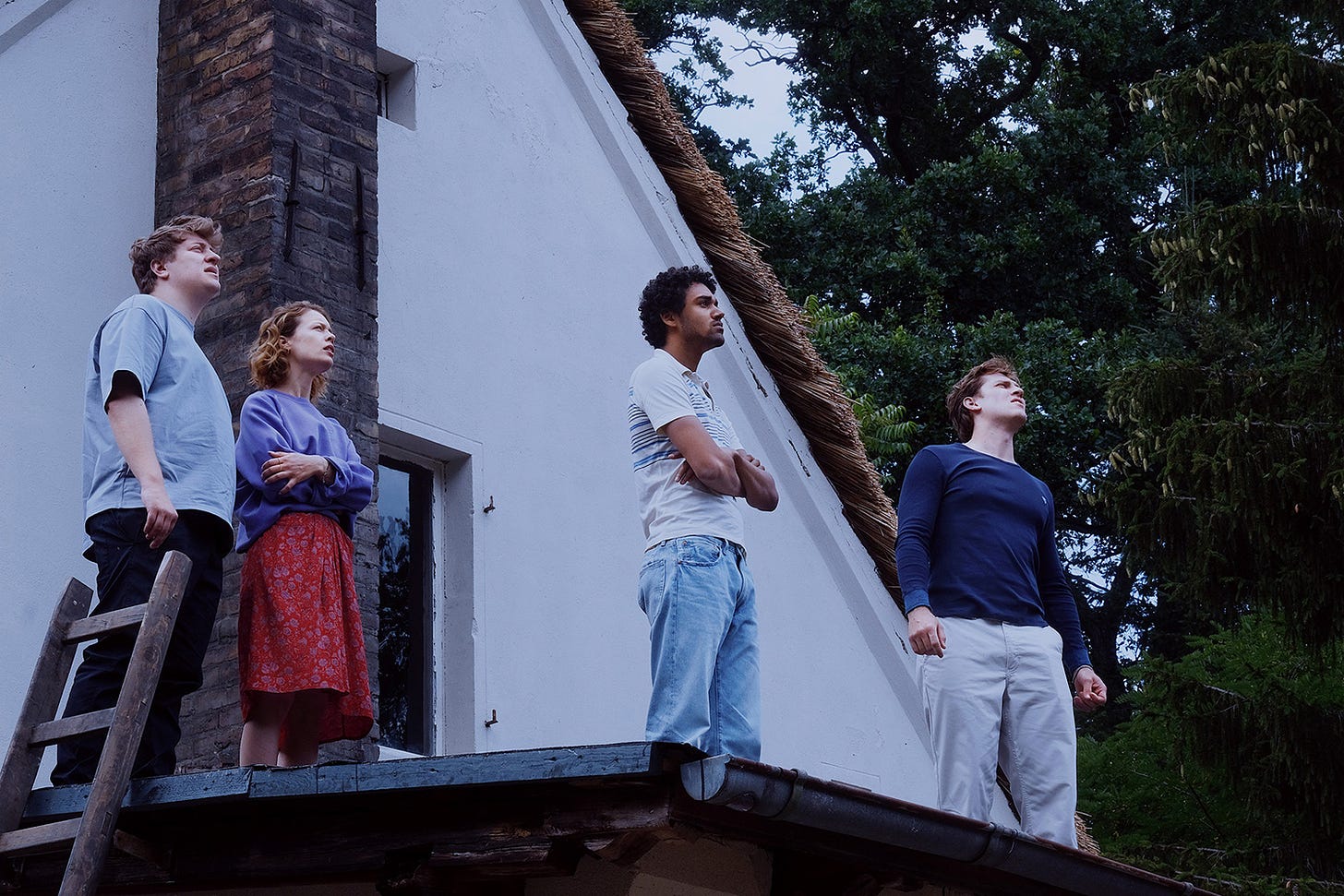
AFIRE [Roter Himmel]
(now in limited release)
The words are barely out of Leon’s (Thomas Schubert) mouth before he begins regretting the pretentiousness and self-martyrdom of the statement. This is a man who has been self-absorbed in his own needs and desires from the moment we meet him at the start of Christian Petzold’s AFIRE while sitting in his best friend Felix's (Langston Uibel) car, a photographer giving him more than we can even assume considering developments still on the horizon.
Leon agreed to a quiet vacation to finish his book. He agreed to let Felix drive him, house him, and entertain him for free—not to be forced to feign humanity by sharing the space with a stranger (Paula Beer’s Nadja) that Felix’s mother double-booked into the family’s summer home without warning. It’s one thing if the work truly didn’t “allow it,” but Leon spends more time falling asleep in the sun than proving he has any work to do at all.
That’s the insular nature of many artists, though. Especially insecure ones on a deadline who know in their hearts that their latest piece isn’t very good. So, rather than accept that reality, Leon lies to himself about its importance. He frets about “distractions” that are really just the normal actions of people his age living by the sea for the summer. He shirks any and all responsibilities of cohabitation, leaving Felix in the lurch when asked to help fix a leaky roof and simply allowing Nadja to make him dinner without ever once offering to repay the favor.
Everything surrounds him. Leon is the sun. The genius. The serious soul who understands the importance of art. And yet he can’t even bring himself to acknowledge the same when confronted with Felix’s new direction for his portfolio. We witness the pause. The loss for words when gazing upon the new portraits. But all Leon gives his friend is a scowl of indifference and faux confusion. Why? Because the photography’s success reminds him just how insufficient his manuscript is.
Petzold has a wonderful knack for tapping into the emotional tumult of his characters and the humor that exists beneath the drama. He writes Leon in a way that ensures we know he knows how foolish he’s being despite having no control over stopping himself from continuing down that path. This is a man who’s so lost in his own head that he refuses to see the life and excitement around him. If anyone dares to have fun, it becomes a personal attack. If anyone dares to feel hurt, it’s from a lack of caring about his feelings.
Most films like this would therefore work towards showing their audience that this flawed character has the room to grow, but Petzold piles on instead. He does so by constantly adding to Leon’s troubles with another (better looking) stranger (Enno Trebs’ Devid) to whom Felix and Nadja take a shine, the potentially devastating news that his publisher (Matthias Brandt’s Helmut) wants to meet in-person to talk about the latest draft, and the ever-looming opportunity for tragedy with forest fires raging nearby.
The most cutting trouble, though, is the reality that everyone else actually has it worse than him—not that he could ever open his eyes wide enough to recognize it. He doesn’t ask Felix what he can do to earn his stay. He doesn’t ask Nadja anything about her life or aspirations. He literally attacks Devid for something as innocuous as telling a fictionalized story as if doing so was pointed commentary on how easy Leon’s profession was.
And it’s all compounded by the fact that artists actually improve by experiencing what’s happening around them. By asking for advice (Felix finds a fresh avenue towards creativity simply from his willingness to meet new people and listen to them) or putting aside the work for a while to enjoy yourself and return to it later. It’s no coincidence then that this week quickly becomes more energetic and interesting than anything written in the pages he’s squirreled away from being read by anyone. Or that the winds might change to show just how privileged he is to be able to create something from nothing.
AFIRE is beautifully orchestrated with so many glimpses of joy and laughter from afar as Leon angrily watches, too embarrassed to ask to join and too prideful to admit the error of his way. It also finds itself moving from a breezy sense of low stakes (beyond Leon’s delusions of grandeur) to a really dark place of melancholic introspection and self-realization—the sort of rug-pull fans of Petzold should always expect considering how emotionally heavy his dramas ultimately prove.
The shift is so impactful that a final moment of possible hope can’t help but make you think its smile will soon disappear too. Because Leon doesn’t really do anything to warrant the number of people who truly want to be his friend. The sheer lack of redeemable qualities exposed by the steady unraveling of his own self-prescribed mythos shows us he deserves pity more than love. But that would also diminish just how brilliant Felix, Nadja, and Devid are. They don’t need to be brought down to his level to prove anything. Because he’s not their sun. They’re simply providing him stars.
- 8/10
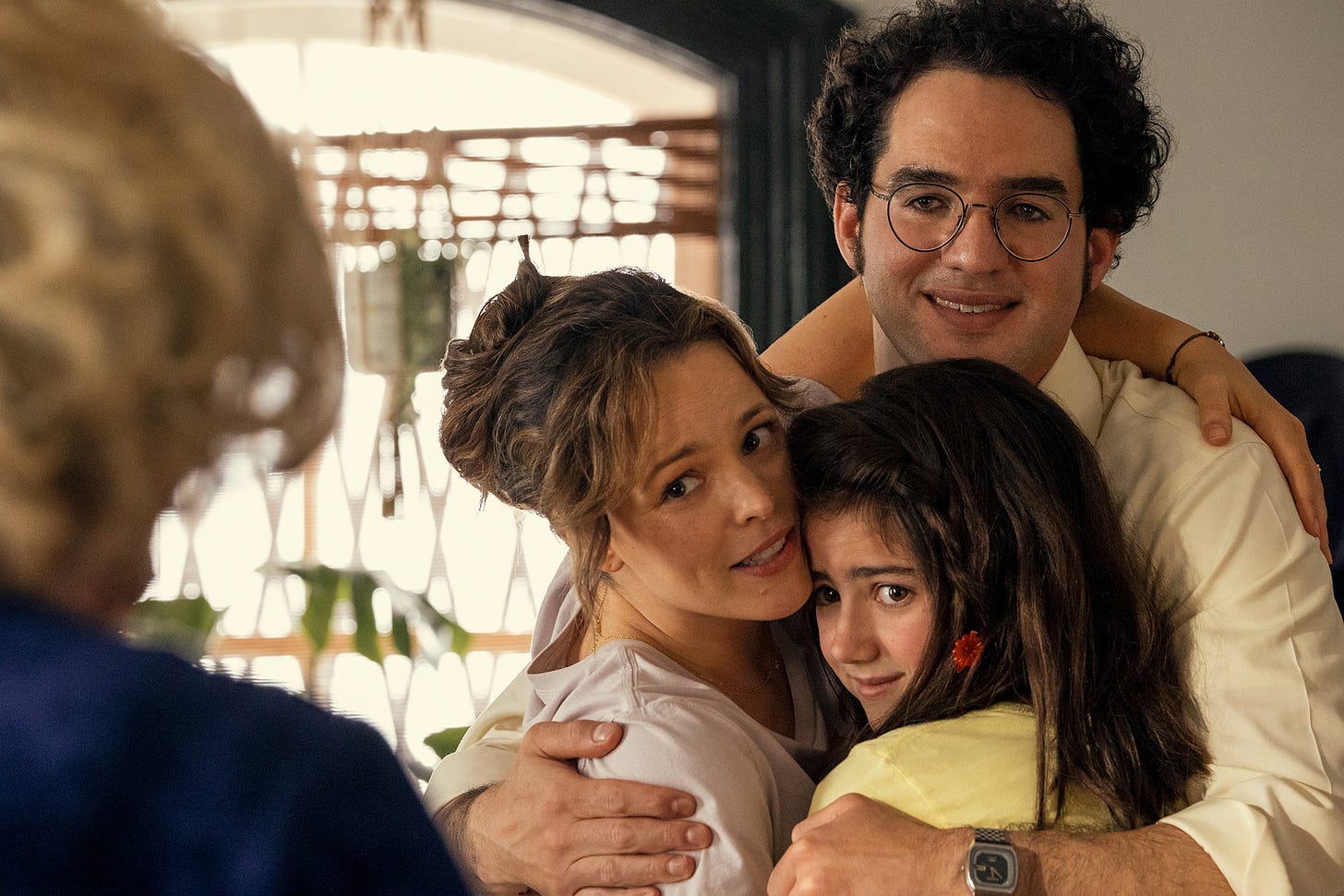
ARE YOU THERE GOD? IT’S ME, MARGARET.
(now on Digital HD/VOD)
There aren’t many adaptations of Judy Blume’s work (at least not yet with a few currently on deck). Even so, it feels weird a book as seminal as ARE YOU THERE GOD. IT’S ME, MARGARET? only just now hit the big screen fifty years after its publishing. Give the author credit for not simply cashing in on selling the rights straight away. She has every right to protect the sanctity of the material and it just goes to show how good a pitch writer/director Kelly Fremon Craig and producer James L. Brooks delivered to finally earn the right. The filmmaker’s previous work EDGE OF SEVENTEEN (it’s wild Craig hasn’t made anything since considering the acclaim) surely played a huge role in that decision—the care in which it depicts a complex mother/daughter relationship and the experience of teenage struggles proving she understood the importance of emotional authenticity. It should be no surprise then that this one excels in much the same way.
It’s a faithful transition from page to screen both in content and context (I read the book for the first time a couple months ago). All the best funny, awkward, and courageous moments of Margaret’s (Abby Ryder Fortson) year of upheaval (moving from NYC to the NJ suburbs, having her first crush, reaching puberty, flirting with religion, etc.) are there along with a welcome expansion of Mom’s (Rachel McAdams’ Barbara) own complicated journey from art teacher to stay-at-home PTA fundraiser recalibrating her needs and desires. The latter is a crucial update that adds a new level of drama by allowing us to fully understand Barbara’s place in Margaret’s life beyond just another supporting role. So much of the plot starts with her that it deserves the added depth to make the whole a three-generational example of unconditional love within a world too often ruled by conditions (rounded out by Kathy Bates’ Grandma Sylvia).
That theme follows through Margaret’s daily life at school thanks to new BFF Nancy (Elle Graham, who is phenomenal in a complicated role that perfectly balances obnoxiousness and insecurity). To whom is Margaret giving her trust and how are they manipulating or exploiting it? How does that push out further when you think about Sylvia’s quest to make Margaret Jewish (her parents, Benny Safdie plays Dad, raised her without religion so she can choose herself) or Barbara’s parents’ demand that she be Christian (one change I didn’t love is the softening of just how single-mindedly selfish these two characters were in the book)? The underlying premise of the film is Margaret deciding to pray for the first time in her life and see what God (any God) has to offer before discovering she’s really just talking to herself. Not that that’s nothing, though. We sometimes need that intention to work through what it is we want outside of what others want for us.
This sense of initiative and autonomy is the real draw regardless of medium and Blume does a great job letting it evolve naturally. She lets Margaret put her foot in her mouth (letting rumors about Isol Young’s Laura Danker color interactions instead of actually talking to her) and be a sheep (agreeing with Nancy and their “secret society” about boys at school despite having a crush on Aidan Wojtak-Hissong’s endearingly charming Moose instead) before recognizing the error of her way through consequences rather than lectures. The Simon women find themselves by using just those societal “norms” they need to be happy, throwing the rest away with authority and zero regret. It’s that sense of agency that makes this coming-of-age tale so universal and necessary—enough to reach beyond gender and/or experience. And if it also helps normalize traditionally taboo topics like menstruation for immature boys (and men) in the audience, all the better.
- 8/10
BLACK ICE
(now in limited release)
So many of the experiences shared during the course of Hubert Davis’ BLACK ICE can be attributed to Debra Thompson’s perfectly stated definition of “systemic racism” and its hold on the sport of hockey. She explains the error of thinking that befalls too many people when they hear the phrase. That it doesn’t mean hockey is full of racists. It means that even if hockey had no racists at all, its culture and traditions would still adversely affect the people of color within the sport when compared to their white establishment counterparts. Just listen to Kirk Brooks talk about his experience building youth teams and how most of the young Black children who get involved admit no one had ever asked them if they wanted to play hockey before. Why? Because people operate under the racist assumptions that hockey is a “white sport” and Black kids aren’t interested. And by never trying to bridge the divide, the assumption ultimately widens the gap.
Beyond those social implications and the numerous first-person accounts describing so-called “isolated incidents” that the powers that be refuse to label a pattern despite them happening for over a century (shared by the likes of Wayne Simmonds, Blake Bolden, Matt Dumba, Sarorya Tinker, and Akim Aliu, the first player to truly call out the hate and prejudice occurring behind closed doors in the insular world of hockey), the film’s crown jewel is its breadth of history. Not just the obligatory inclusion of Willie O’Ree or an education on Herb Carnegie’s impact before him, but also the Colored Hockey League of Nova Scotia—an entity that some descendants of those who played in it didn’t even know existed. This was a league that had connections to land (Africville), heritage, and the sport itself, lasting from 1895 to 1930. And Cecil Harris arrives on-screen to share documented proof that it was Black athletes in the CHL who originated the slap shot and goalies playing the puck decades before such things were seen in the NHL.
That truth can really empower Black athletes in the sport to tell future generations that it hasn’t just been them paving the way. The Black community in Canada has been a part of this sport since the beginning, so anyone telling them they don’t belong has no legs to stand on. To move through the film is to therefore witness that recognition even as the tales of racism grow more and more disturbing (the youngest player interviewed is currently still in juniors talking about an incident—yet to be rectified months later—involving another teenage boy who refused to shake his hand their entire shared careers). Davis does well to never let the good or bad overpower the complexity of the full picture so his audience can realize things are simultaneously moving in the right direction while still being a long way away from “fixed.” It takes a lot of courage for his subjects to tell their stories too, but giving voice to their struggles along with the hope of their subsequent successes cannot be undervalued in the broader sense of finally instilling real change.
- 7/10
INFINITY POOL
(streaming on Hulu)
What happens when you give bored members of white high society carte blanche where their hedonistic and sadistic proclivities are concerned? They’ll graciously give their thanks with a sinister smile before wreaking havoc without a shred of remorse. Look at THE PURGE. Look at HOSTEL. This isn’t a novel concept. Nor is the decision to use a member of that rarified air who doesn’t quite know what their proclivities are like Brandon Cronenberg’s author of zero note, James Foster (Alexander Skarsgård). Yes, he wears his apathy on his sleeve while letting his much more empathetic, publishing empire heiress wife (Cleopatra Coleman’s Em) foot the bill, but it’s not like James is craving blood. Not like the unhinged insanity visibly bubbling beneath the surface of their vacation friends Gabi (Mia Goth) and Alban Bauer (Jalil Lespert). The question is whether he’ll need a push to start.
There’s a lot of promise with INFINITY POOL to therefore mine James’ soul as he descends into the seemingly consequence-free lifestyle people like the Bauers adopt upon discovering a wild, unexplainable secret at the heart of island getaway La Tolqa’s lucrative tourist trap for the elite. Once James knows that he can kill, maim, and steal whoever and whatever he wants with nothing more than a modest dent in his bank account for the trouble, will he go whole hog? Will he lose himself to the allure of power and control that he believes he lacks as a trophy husband beholden to his wife’s money? And what happens if his new friends decide to turn the table and make him a different kind of plaything that the impoverished natives of this fictionalized country can’t provide? The room for psychological and emotional upheaval is, pardon the pun, infinite. Let James slide into oblivion to see how he comes out while commenting on the state of the world’s yearning for excess.
Sadly, Cronenberg doesn’t seem interested in saying much at all. More than an exercise in calling out greed and perversion, the filmmaker uses his art to give it shape. He approaches the subject with a similar apathy as his characters—presenting a cesspool of drugs, sex, and violence from a position of complacency. Why punish the abusers? They won’t learn a lesson. Why punish the collaborators (see Thomas Kretschmann’s native police officer Thresh)? They’ll always exploit their position for an alternative revenue stream that keeps them from the squalor of their neighbors. It’s not about giving James the ability to become an animal or the clarity to stop. It’s merely a glimpse behind the curtain of unadulterated psychopathy. Because it isn’t a switch that can be flipped. You either embrace the chaos or get consumed by it. So, while the ride might be fun, it’s a train going nowhere fast. Rather than envy or pity James, we simply shrug and move on.
- 6/10
THE LAST OF US: Season 1
(streaming on Max)
As someone who never played the video game and therefore had no clue what THE LAST OF US was about, I assumed it was just another zombie apocalypse. And while that assumption was reductively correct, there’s obviously a lot more going on. Enough that the biggest surprise for me was the reality that the series (and, presumably, the game since many say Craig Mazin and original creative director Neil Druckmann’s adaptation is extremely faithful) was much less THE WALKING DEAD and much more FALLING SKIES than I anticipated. The factions between survivors and military and raiders and rebels and collaborators. The quarantine zones and fights to stay hidden and safe from an unfamiliar entity. Despite the infected not finding sentience to speak and present their demands beyond nature simply evolving and invading as an involuntary act of preservation, this really does feel like a battle against an alien force.
But then, of course, is the reality that neither of those shows (nor this one) were ever truly about the so-called enemy. That entity was always a means towards proving how mankind’s worst adversary is and will always be itself. That takes on greater meaning here too since the whole reason Earth has been ravaged by this incurable fungal infection is because of global warming. We brought it on ourselves. So, we’re presented with an incredibly succinct and scary opening scene from the 1960s as two scientists on a talk show explain their greatest fears. It drives the point home perfectly since, as we’ve seen with COVID, deaths can be overcome (although they shouldn’t need to be solely due to the unnecessary politicization of medical expertise and empathy). To shift focus to a fungal outbreak like that of the Ophiocordyceps unilateralis, however, is to accept abject futility. It’s not a matter of rolling the dice anymore. Or mitigating symptoms. To be infected is to die. Full stop. That genie cannot be put back into its bottle.
At least that’s what the world believed since fourteen-year-old Ellie (Bella Ramsey) seems to be an outlier to the rule. Bitten weeks ago and yet still not turned, rebel force leader Marlene (Merle Dandridge) wonders if her blood might be a cure to end their suffering. Enter Joel (Pedro Pascal), a fifty-six-year-old former contractor turned smuggler with no allegiances to any group (governmental FEDRA, resistance Fireflies, or violent raiders). Already on his way west from Boston to find his brother, he and Tess (Anna Torv) get roped into a quid pro quo escort mission. Deliver Ellie to a scientific Firefly camp with the means of manufacturing a vaccine and receive a fully functioning vehicle to discover if Tommy (Gabriel Luna) is still alive. It won’t be easy or safe, but Joel is two decades removed from caring about whether his hands need dirtying to achieve his very selfish goals. So, off they go into the great unknown and violent world to become forever changed.
There’s very little filler in their nine-episode journey through Hell. Some episodes are almost entirely flashbacks, but the information and context presented within prove crucial to the present task at-hand. Don’t therefore dismiss the story of Bill (Nick Offerman) and Frank (Murray Bartlett) as an interlude of hope. It may possess a necessary dose to combat the otherwise horrific tragedies that end the first two episodes, but it also reminds us that light in the darkness has an expiration date. At some point it will extinguish. Death comes regardless of whether the bringer is a fungus, bullet, or time itself. We therefore need its brilliant display of unexpected love (“Long, Long Time” is as good as the hype, a contender for best episode of TV this year) to cut a path forward even if it won’t be coming along for the ride. Because lessons are learned. Exposition is shared. Life and loss coexist to portray the best and worst of humanity simultaneously. And Joel and Ellie’s quest simply carries on.
The same can be said with “Endure and Survive”, my second favorite chapter of the whole with an unforgettable villain (Melanie Lynskey’s Kathleen is driven by justified revenge) and friend (Lamar Johnson’s Henry, a survivor weighed down by a conscience most have relinquished long ago). These characters become mirrors of who and what we can become when our backs are against the wall in an oppressive fascist state. They show how FEDRA and the Fireflies aren’t really that different from each other—two sides of the same coin that demand a monopoly on control. It’s why a flawed man like Joel proves so relatable. He doesn’t want power. He exists in the shadows to use their mutual desire for it to his advantage. Why? Because he was Henry before the fall. And he was Kathleen after it. These aren’t unique figures. Their sadness and rage is the norm. It consumes them whole. Joel is the exception for the simple fact that he’s stayed alive to forsake both archetypes.
We get backstory for Joel in the harrowing “When You're Lost in the Darkness” and for Ellie in the playful yet tragic “Left Behind”. We experience the promise of post-apocalyptic life through Maria Miller’s (Rutina Wesley) commune in “Kin” and the evil that can arise when the leader of your flock is a wolf in sheep’s clothing like Scott Shepherd’s David in “When We Are in Need”. And all the while Joel and Ellie are ravaged by physical and emotional violence, driving up their already overflowing pool of trauma beyond its point of no return. It’s one thing to watch his gruff exterior melt into the vulnerability of fear, but another to see her sarcasm and smile disappear in lieu of a thousand-yard stare that would destroy most teens her age. That terror and despair being so visceral is a testament to the acting. Pascal and Ramsey bring their A-game from the first moment they’re seen on-screen to a nihilistic gut punch of an ending that tests their desire to keep going or allow themselves to believe their own lies.
It’s a challenging finish that will probably anger viewers. Not because of what it is, but because its authenticity to the characters and situations we’ve spent the past nine hours with confirms their worst flaws. You want to believe that doing their best taught them something along the way and that they can put those lessons to work to better themselves and the people they care about. While that result leaves a warm feeling, however, it often comes across as a hollow fabrication meant to sell virtue above pain. But there’s a reason the most romantic and hopeful chapters of this season ultimately end in horror. That result is unfortunately what most of us experience in our real lives too. Any anger towards what happens is thus less about the cost and more about the recognition that we might have done the same. Because what was it that Ellie said her biggest fear was? Discovering she was alone. The things we’ll do to avoid that solitude are infinite and sometimes heroically saving the person who prevents it proves the most cowardly act of all.
- 9/10

NIMONA
(streaming on Netflix)
Animators at the now defunct Blue Sky Studios said their feature adaptation of Nate Stevenson’s Nimona was 75% complete at the time Disney (who shuttered them after acquiring their parent company Fox) pulled the plug in 2021. Not sure you can feasibly say that was an example of new Business Daddy cutting the chaff of old Business Daddy (at least not back when studios pulling and canceling projects for tax relief purposes wasn’t the norm like it is today).
Add Bob Chapek bungling his response to Florida’s “Don’t Say Gay” bill (before subsequently doing an about-face that still wasn’t enough to save his job) making it seem the property’s overt LGBTQ+ themes and characters were the real reason for its demise and it’s somewhat surprising another studio was willing to resuscitate the film so quickly. But that’s exactly what directors Nick Bruno and Troy Quane, along with Annapurna and Netflix, did. In just over two years, Nimona (Chloë Grace Moretz) and Ballister Boldheart’s (Riz Ahmed) adventure was officially complete.
And what an adventure it is. Cast in the mold of your usual “humans are the real monsters” tale, the film brings medieval aesthetic into a science fiction future to upgrade the usual heroics of knights with swords to laser guns and flying cars. For one thousand years this kingdom has stayed true to the values of its founder Gloreth who instituted a royal aristocracy to maintain the safety of the people from dangerous monsters outside their borders.
A queen would always sit on the throne and her knights would always be chosen from descendants of knights of old or other worthy contenders born of “royal stock.” Walls went up to surround them and cannons were built and improved as technology advanced. Soon the thinking of everyone within became insular and incestuous to the point of a populace willingly embracing oppression. Until Queen Valerin (Lorraine Toussaint) dared to cut a new path by giving a young commoner the chance to prove anyone could be a hero.
Fast-forward to the present and the young boy-turned-knight discovers just how far some will go to maintain the status quo. Framed for murder on the day of his anointment, Ballister must flee the order he’s sworn to protect (led by Frances Conroy’s Director) and the man he loves (fellow knight Ambrosius Goldenloin, voiced by Eugene Lee Yang). Lost and alone with seemingly no way to clear his name, Ballister doesn’t have a choice when the chaotically feral Nimona darkens his door.
Whether he’s a villain or not doesn’t necessarily bother her (she would actually prefer he were so she might be given the green light for destruction). She merely wants to exist somewhere where she’s welcome. Appreciated. And who better to give her that chance than someone who might be even more reviled than her? Either they vindicate him and he helps usher Nimona into respectability or they embrace their roles as villains together.
The film proves a wonderful mix of genres with things quickly moving from medieval adjacent themes to a detective story seeking evidence of Ballister’s innocence to a tragically heartfelt fairy tale that corrupts the seeds of love via our current era’s tribalistic fearmongering rather than give it what it needs to flourish. And all throughout are energetic brawls made ever more captivating by the realization that Nimona actually is a “monster.”
But where most of society equates her “otherness” (she’s a shapeshifter who can turn into any animal—always with a hot pink hue—or person—alternatively, whatever hue that person really is) as evil in need of eradication, Ballister gradually sheds such knee-jerk indoctrination to see she’s just as in need of a friend as him. It won’t be a smooth road towards that understanding (and Nimona’s desire to make it as rocky as possible is part of the charm), but it will be educational and relatable in ways both children and adults are in desperate need to remember. Because our society is falling rapidly into torch-carrying mob territory.
With stunning animation (not quite as rough and tumble as the Spider-Verse films, but still with its own unique style to set it apart from the homogeneity of Pixar/Dreamworks) and a great soundtrack (put Metric in more films challenge), there’s little to dislike (unless you’re a homophobic bigot who believes heroes can only be cis white buffoons like Beck Bennett’s Sir Thoddeus Sureblade).
Ahmed’s Ballister is a great protagonist—one who’s brainwashed enough to not see what’s right in front of his face, but smart and malleable enough to learn and recognize when he’s wrong. Yang’s Ambrosius is a perfect foil with confused allegiances pitting heart against head while Conroy’s Director proves an even better antagonist with the cold malice of an early Disney villainess. But this is Moretz’s show. Nimona’s sarcasm, rowdiness, cockiness, and vulnerability is second-to-none. She’s exactly the sort of counterculture hero we need right now. Someone to remind the world that being different than the status quo isn’t a shortcoming. It’s a strength.
- 9/10
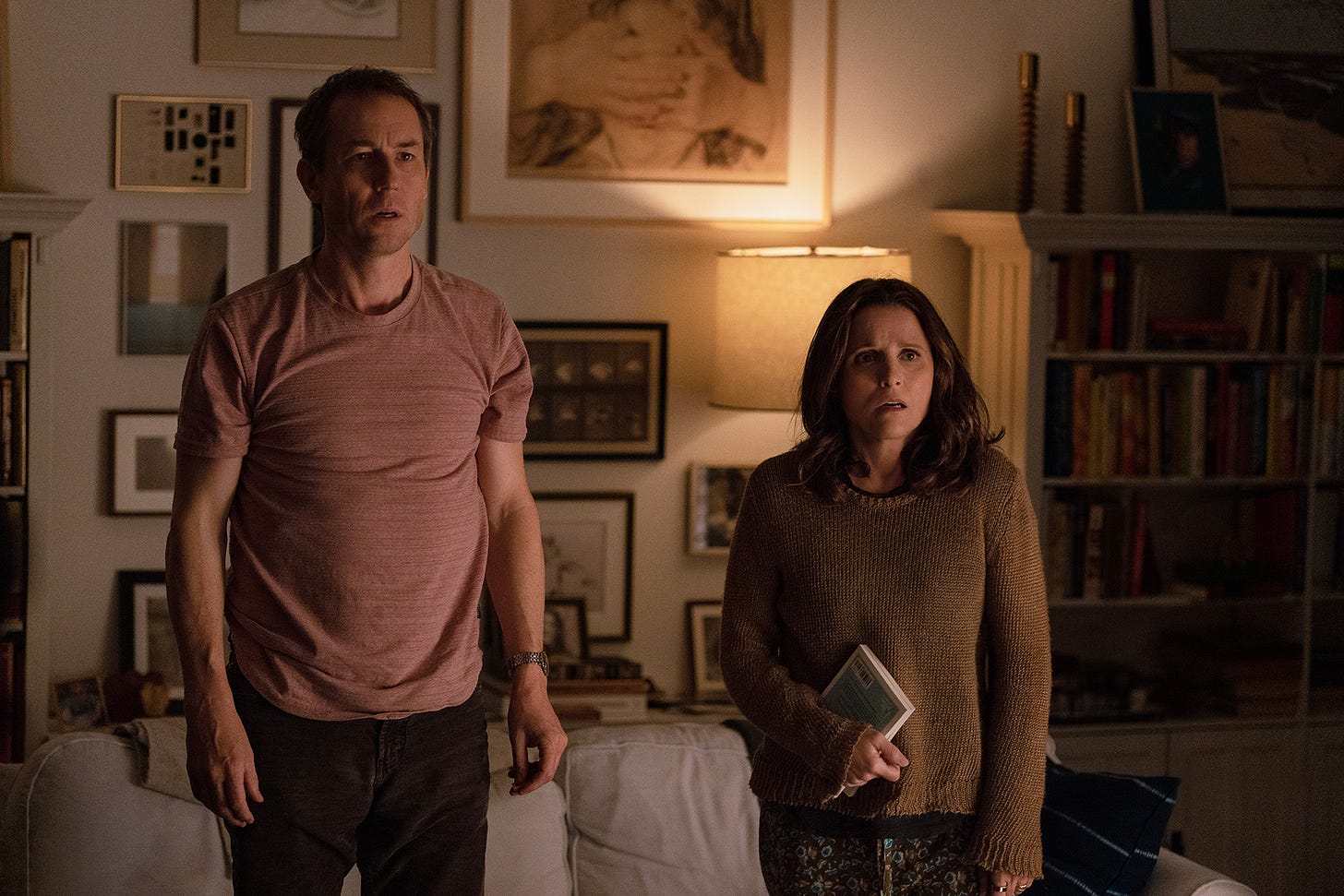
YOU HURT MY FEELINGS
(now on VOD)
What happens when people decide white lies and supportively empty praise are akin to betrayal except when coming from them? That appears to be the question writer/director Nicole Holofcener presented herself upon writing the very funny YOU HURT MY FEELINGS. Because while the main example of “disloyalty” stems from Beth (Julia Louis-Dreyfus) accidentally overhearing her husband Don (Tobias Menzies) say he didn’t enjoy her new book despite telling her how great it was through multiple drafts, it isn’t the only one. These types of situations pervade existence. Beth and Don tell their son Eliot (Owen Teague) he’s amazing regardless of anything he’s actually accomplished outside of that role. Beth’s sister Sarah (Michaela Watkins) admits she lies to her husband Mark (Arian Moayed) after poor performances because she genuinely believes he’s a great actor. Don keeps his mouth shut when seeing patients in hopes they discover how to heal themselves and they smile back before muttering how useless he is as a psychiatrist.
Holofcener delivers countless such examples throughout the script not as a means of exposing Beth to her own hypocrisy, but to portray just how common and necessary these interactions are. Case and point: Beth and Sarah’s mother Georgia (Jeannie Berlin). Here’s a woman with no filter or time to coddle. And they hate it. They label her honesty as crazy. Her inability to feign interest in the uninteresting as rude. Why? Because we are a species of people-pleasers and insecure babies. We tell ourselves that we can handle the truth and then spiral out of control when we actually confront it. It’s easier to simply deflect and distract than it is to face facts that ultimately don’t matter in the long run because we simply don’t have the time or energy to traverse the minefield of emotions and assumptions inevitably unleashed when we try. Who cares if Don thinks Beth’s book isn’t good? He’s not a writer. He’s not a critic. Who cares if he thinks it is good? Beth does.
Frustrations run amok as a result due to the scenarios that demand fibs growing in number across multiple levels. Some are a product of love. Some professional responsibility. Some nothing more than plain convenience. And whether it’s Beth or Eliot or Don’s patients (the inspired casting of real-life couple Amber Tamblyn and David Cross or the always dryly combative Zach Cherry), choosing the lie becomes the default because everyone is too tired to process the potential consequences of a generally consequence-less crime. Except, of course, when you’re in a movie whose entire purpose is to expose those consequences. Then it becomes a crucial point of thinking—especially for those trying to find their way out of the unavoidable guilt of knowing their attempt to placate and inspire might have conversely harmed their target instead. The film can therefore feel a bit too perfect in its cause and effect (Teague is often used as a narrative device more than as a human being), but the comedy sells itself.
The same can be said about the multiple ending points thanks to so much focus being put on Don’s so-called betrayal. As soon as Beth’s unjustifiably harsh reaction to her justifiably hurt feelings is finally hashed out, you feel as if the whole should be over. But that’s just the first of many stages of epilogue-fueled clarity since Sarah, Mark, Don’s patients, and everyone else also had their own flirtations with the unspoken rules of a society falling apart. The humor born from the different situations are worth the constant fade-to-black fake outs even if each new character-specific conclusion feels cutely sanitized in the process. Keeping a little mess involved isn’t always a bad thing and I do believe YOU HURT MY FEELINGS could have benefited from more. I get the desire to finish on more satisfying notes since the script is mostly bickering and name-calling beforehand, though. And, as long as it remains funny, who am I to fault the decision?
- 7/10
Cinematic F-Bombs:
This week saw THE DESPERATE HOUR (2022), THE FIGHT (2020), NO TIME TO DIE (2021), THE QUEEN (2006), and ROSALINE (2022) added to the archive. An auspicious week with the inclusion of the now unavailable ROSALINE to prove that Hollywood’s tax break gymnastics shouldn’t completely erase works of art from existence and newly approved NY federal judge, Dale Ho. cinematicfbombs.com
New Releases This Week:
(Review links where applicable)
Opening Buffalo-area theaters 7/14/23 -
THE MIRACLE CLUB at Regal Transit & Quaker
PERSIAN LESSONS at North Park Theatre (select times)
PSYCHO-PASS: PROVIDENCE at North Park Theatre (select times); Regal Galleria
Streaming from 7/14/23 -
BIRD BOX: BARCELONA – Netflix on 7/14
IMAGINE DRAGONS LIVE IN VEGAS – Hulu on 7/14
LOVE TACTICS 2 – Netflix on 7/14
QUICKSAND – Shudder on 7/14
YUZURU HANYU ICE STORY 2023 “GIFT” AT TOKYO DOME – Disney+ on 7/14
UNKNOWN: CAVE OF BONES – Netflix on 7/17
TORI & LOKITA – Criterion Channel on 7/18
“All I felt was a constant sense of dread—knowing how things were destined to play out and biding my time in the hopes it wouldn't suddenly turn graphic too. At least [the Dardennes] refuse to showcase the abuse they put these characters through on-screen.” – Full thoughts at HHYS.
THE (ALMOST) LEGENDS – Netflix on 7/19
THE DEEPEST BREATH – Netflix on 7/19
GLITCH: THE RISE AND FALL OF HQ TRIVIA – Netflix on 7/20
Now on VOD/Digital HD -
ASTEROID CITY (7/11)
“Put it all together and you get another breezy escape into Anderson's singular quirk that ultimately makes you nostalgic for his earlier, objectively stronger work.” – Full thoughts at HHYS.
ATTACHMENT DIARIES (7/11)
CADEJO BLANCO (7/11)
CARMEN (7/11)
CHILE ‘76 (7/11)
GOD IS A BULLET (7/11)
INFLUENCER (7/11)
“The result is a well-executed thriller wherein we’re allowed to check our compassion at the door. There's no one to therefore root for, so we bask in the potential carnage to see who (if anyone) escapes alive.” – Full thoughts at HHYS.
JOYLAND (7/11)
“JOYLAND ultimately proves itself to be about complicity. The ways in which our silence allows for the systematic dismantling of another's chance to be free.” – Full thoughts at HHYS.
L’IMMENSITA (7/11)
PILGRIMS (7/11)
“This is a film about the psychological scars of places, objects, and people. And it doesn't shy away from the complexity of those scars extending beyond just the victims' loved ones.” – Full thoughts at HHYS.
RALLY ROAD RACERS (7/11)
SPOONFUL OF SUGAR (7/11)
“There are definitely some intriguing moments and worthwhile commentary about double-standards and how abused people abuse others, but so much of it arrives as shock value without depth.” – Full thoughts at HHYS.
THE STARLING GIRL (7/11)
“Credit Scanlen and Pullman for portraying the nuance inherent to this dynamic and Parmet's deft handling of the material to ensure these three-dimensional circumstances aren't flattened to accommodate any one agenda.” – Full thoughts at HHYS.
TRANSFORMERS: RISE OF THE BEASTS (7/11)
THE CHANNEL (7/14)
THE LEAGUE (7/14)






